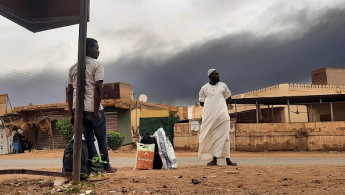Sudan in pieces as conflict enters third month
Sudan's devastating war raged into a third month on Thursday, as a governor's killing marked a new escalation in the western region of Darfur.
Since April 15, the regular army headed by Abdel Fattah al-Burhan and the paramilitary Rapid Support Forces (RSF) commanded by his former deputy Mohamed Hamdan Daglo have been locked in combat that has destroyed entire neighbourhoods of the capital Khartoum.
The fighting quickly spread to the provinces, particularly Darfur, and has killed at least 1,800 people, according to the Armed Conflict Location and Event Data Project's latest figures from last month - though definite figures are difficult to come by.
Burhan accused the RSF of killing the governor of West Darfur state, Khamis Abdullah Abakar, in a "treacherous attack" on Wednesday.
Abakar was captured and later killed after he made remarks critical of the paramilitaries in a telephone interview with a Saudi TV channel.
The Darfur Lawyers Association condemned his "assassination" as an act of "barbarism, brutality and cruelty".
Nationwide, Sudan's war has driven around 2.2 million people from their homes, according to the International Organization for Migration.
Of these, more than 528,000 have sought refuge in neighbouring countries, said the UN agency.
"In our worst expectations, we didn't see this war dragging on for this long," said Mohamad al-Hassan Othman who has fled his home in Khartoum.
Everything in "our life has changed," he told AFP. "We don't know whether we'll be back home or need to start a new life."
'Completely devastated'
"We have nothing left," said one Khartoum resident, Ahmed Taha. "The entire country has been completely devastated.
"Everywhere you look, you'll see where bombs have fallen and bullets have struck. Every inch of Sudan is a disaster area."
US and Saudi mediation efforts are at a standstill after the collapse of multiple ceasefires in the face of flagrant violations by both sides.
A record 25 million people -- more than half the population -- are in need of aid, according to the UN, which says it has received only a fraction of needed funding.
Saudi Arabia has announced an international pledging conference for next week.
Many of the displaced have lost loved ones as well as "all their belongings and livelihoods", said Anja Wolz of aid group Doctors Without Borders.
The group, which runs mobile clinics for the displaced in Madani, 200 kilometres (120 miles) southeast of Khartoum, noted a "worrying increase" in people escaping the capital.
Despite dangers and obstacles, latest UN figures say aid has now reached 1.8 million people, still only a fraction of those in need.
"We have been suffering and suffering and suffering the scourge of this war for two months," said another Khartoum resident, Soha Abdulrahman.
The conflict's other main battleground, Darfur, was already scarred by a two-decade war that left hundreds of thousands dead and more than two million displaced.
No 'red lines'
The army on Wednesday said the "kidnapping and assassinating" of West Darfur governor Abakar was part of the RSF's "barbaric crimes".
Sudan analyst Kholood Khair said the "heinous assassination" was meant "to silence his highlighting of genocide... in Darfur".
Khair, founder of Khartoum-based think tank Confluence Advisory, said in a tweet it was unclear "what the red lines are anymore", urging international condemnation "as well as action to protect the people of Darfur and elsewhere".
Homes and markets have been burnt to the ground, hospitals and aid facilities looted and more than 149,000 people sent fleeing into neighbouring Chad.
The Umma Party, one of Sudan's main civilian groups, said El Geneina, the capital of West Darfur state, had been turned into a "disaster zone", and urged international organisations to provide help.
The Darfur Lawyers Association described "massacres and ethnic cleansing" in El Geneina carried out by "cross-border militias supported by the RSF" which "serve agendas that have nothing to do with the interests of Darfur or Sudan".
Daglo's RSF have their origins in the Janjaweed militias which former strongman Omar al-Bashir unleashed on ethnic minorities in the region in 2003, drawing charges of genocide, war crimes and crimes against humanity.
An army official said Wednesday that the paramilitaries had begun using drones, which an RSF source said they had obtained "from commandeered army centres".
Both sources spoke to AFP on condition of anonymity because they are not authorised to speak to the media.
According to a military analyst from the region who also requested anonymity for his safety, the RSF might have obtained the drones from the Yarmouk weapons manufacturing and arms depot complex, which they overran just days after the collapse of US and Saudi-brokered ceasefire talks.





 Follow the Middle East's top stories in English at The New Arab on Google News
Follow the Middle East's top stories in English at The New Arab on Google News


